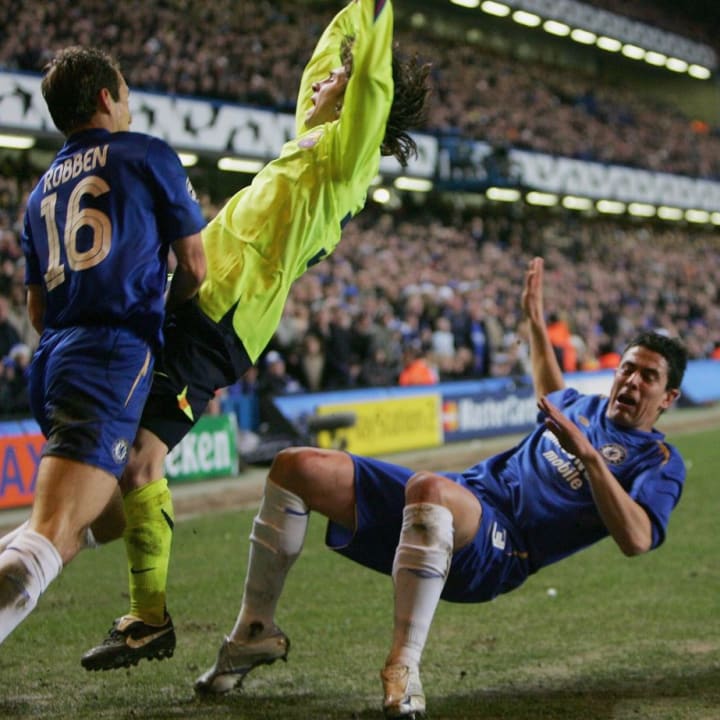
Chelsea in the mud: When Mourinho tried & failed to scupper Barcelona
Chelsea have often cast envious glances in the direction of Barcelona in the years since Roman Abramovich’s arrival at Stamford Bridge.
Although the tables may well have turned, in his early years at the helm the Russian-Israeli craved the elusive qualities that made Barcelona so successful; the glamorous names, the beguiling tiki-taka style and, of course, the glittering trophy cabinet.
Courtesy of a number of famous (and infamous) Champions League nights throughout the noughties, that simmering envy often boiled over into poisonous jealousy both on and off the pitch – perhaps never more so than when Jose Mourinho was in the Chelsea dugout.
As his steady decline continues, the Portuguese has become synonymous with sh**housery and belligerent tendencies, but in 2006 – nearing his peak – we saw a Machiavellian Mourinho at his most brazen.
Chelsea faced Barcelona in the Champions League for the second consecutive year having defeated their adversaries in an ill-tempered, rip-roaring quarter-final tie in 2005 – during which Didier Drogba was sent off, Mourinho accused his counterpart Frank Rijkaard of consulting the referee, and the Catalans were stunned by three goals in 20 minutes in the second leg.
That defeat – and the war of words between Mourinho and Rijkaard that engulfed it – had left a sour taste for Barça, who felt they had suffered injustice at the hands of a playing style that was the antithesis of their own.
Before the two sides renewed rivalries at Stamford Bridge in 2006, Mourinho’s programme notes read: „The word ‚revenge‘ should not be a word in football. If the word exists in football, then it exists only for losers.“

Although you would think Chelsea had little to fear following their success a year prior, this Barcelona was a different animal, due the development of their tiki-taka style reaching it’s final stages and the emergence of a certain Lionel Messi.
Mourinho evidently decided mind games wouldn’t be enough to stop their free-flowing visitors, and instead opted for something more physical. After the newfound rivals were drawn against each other once again in December, the Stamford Bridge became a mud bath in the weeks leading up to February’s first leg.
While the Spanish media suggested this was deliberate, the official line was that the club were waiting for the opportune moment to relay the playing surface and Mourinho was conscious of his players getting injured mid-season while a new one bedded in.
The Barcelona players inevitably caught wind of the accusations. „I cannot believe it. I have heard they are making the condition of their pitch worse. I’ve heard many complaints about the pitch,“ defender Sylvinho said.
„We know the pitch is not good, the criticism is fair. But only stupid people can think that a team like Chelsea with the quality Chelsea have can be happy with a pitch like this. Because we have no technical players we need a potato field, so we play on a potato field.“
– Jose Mourinho, 2006
„We are looking at the long term and want to give next season’s pitch every chance,“ a spokesperson told the BBC at the time.
„We’ve also got a problem in that we need a two-week window to re-lay the pitch and we’re involved in so many games that it is just not possible.
„Don’t forget the pitch is the same for both teams and, let’s face it, our football isn’t suffering.“
By the time the first leg rolled around on 22 February the pitch was a state, with large swathes of the surface without grass altogether. Pre-match, the sight of the sprinklers soaking the patchwork turf belied Chelsea’s official stance.
„I don’t think there’s any kind of psychology to it at all. I see it as Chelsea doing the best they can to make the pitch playable and get it in the best state possible. We have to realise Chelsea are affected by a poor pitch as much as we are.“
– Frank Rijkaard, 2006
Ironically, the perilous service – and Messi– arguably led to the Blues‘ downfall in the tie, as their visitors managed not to get bogged down. With just 36 minutes on the clock, 18-year-old Messi showed deceptive strength to beat Arjen Robben to the ball by the corner flag, before tying the Dutchman in knots with a dazzling piece of footwork.
Enter Asier Del Horno. As Messi scuttled away from Robben’s desperate lunge, the hapless Spaniard – infamous for pretty much this moment alone – missed his kick on the uneven surface and careered into the prodigy (although there was a degree of intent, too).

Although a red card was harsh, even at that early stage it was probably warranted for Del Horno on a totting-up basis. The ten men survived until half-time and even took a shock lead through a scruffy Thiago Motta own goal just before the hour mark.
However, despite some exceptional last-ditch defending from John Terry and Ricardo Carvalho, the Barcelona onslaught would eventually yield two away goals – a Terry own goal and a bullet header from Samuel Eto’o with just ten minutes remaining.
That deficit proved insurmountable in the second leg at Camp Nou as Ronaldinho orchestrated Chelsea’s downfall, bouncing off Terry before smashing a shot past Petr Cech. A stoppage-time Frank Lampard penalty was mere consolation.
Barcelona would go on to win a Champions League and La Liga double, enjoying the last laugh in this edition of a sizzling rivalry. Deliberate or not, Chelsea’s trench warfare approach had failed.
Exactly 16 years on from that infamous night, Thomas Tuchel’s will hope for a better result – and a better playing surface – when they host Lille in the round of 16 of the 2022 iteration of the competition.
For more from Krishan Davis, follow him on Twitter.